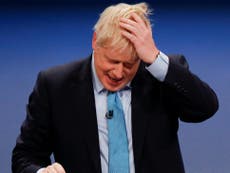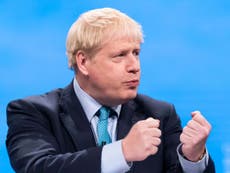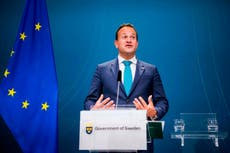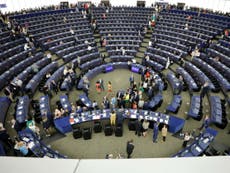Boris Johnson's Brexit deal is not what anyone voted for. The public must have the final say
Already rejected by key players on the EU side, the government's new Brexit deal is both a failure of diplomacy and a betrayal of the 2016 vote

Boris Johnson’s proposed Brexit deal has been cleverly presented as a reasonable compromise. But in reality, it represents a radical break not just from Theresa May’s proposals, but from the last 50 years of British economic and social policy. That’s why it must be put back to the people for a confirmatory referendum. That is the only fair and democratic way forward.
Some still say that since the choice on the ballot paper was between “leave” and “remain”, any deal that means leave is enough. They ignore that in 2016, the leave campaign made a clear offer to the electorate and secured its victory on that basis. If this latest deal’s backers want to avoid being at the heart of a false advertising scandal, they will have to ask the customers – the people – if they still want to buy the product now they’ve seen it.
Some of our colleagues on the Labour benches accept that the deal is a bad one, but say it’s still better than no deal at all. But that need not be the choice.
And Labour MPs in particular should be extremely wary of letting themselves become handmaidens for a deal that will materially disadvantage so many voters. Nor should they fool themselves into thinking that leaving on October 31 will “get Brexit done”. In reality, it will be the start of years of argument, negotiation and renegotiation.
We don’t have to accept a choice between Johnson’s deal and no deal: Hilary Benn’s Safeguards Act protects us all from that threat, and gives us time to develop alternatives. But even if nothing better were on offer, we should not ignore a basic fact: these proposals are so radical and so far removed from anything voters were promised in 2016 that they can only be legitimately passed with direct popular consent.
Our proposal of a final say referendum on any deal is designed to deliver that consent and to avoid unnecessary polarisation. The real choice can and should be between any proposed deal that the EU itself will accept and our current deal as full members of the EU.
Johnson’s proposals are a world away from anything that was debated in 2016. Instead of the frictionless trade we were promised, we get regulatory and customs barriers between British businesses and consumers and our biggest overseas markets for both exports and imports.
For manufacturers, farmers and financial services, the potential consequences will almost certainly be grave. And for a nation that has relied on free trade as the basis of its prosperity since the eighteenth century, this is a fundamental and epochal change – one the voters were never asked to consent to, never mind actually endorsed.
Furthermore, Johnson’ government is reneging on quite explicit promises to preserve laws on workers’ rights, health and safety and the environment. For all the frothing about European red tape in some quarters, these laws are in fact popular. Johnson wishes to remove them under the cover of Brexit because that is the only way it can ever be done.
His Brexit proposal comes from the right, for the right. The government wants to turn us into Europe’s bargain basement, with the lowest taxes on the wealthy, the lowest paid workers – with millions reliant on minimum wage legislation – and the dirtiest places to work and live.
Saying a general election could serve to legitimise the political revolution that this “deal” represents simply does not wash.
Our party system is visibly creaking. Moderate Conservative MPs have been expelled, leaving their less hardline voters bereft. The centre-left vote is deeply split, and in Scotland is further fractured by the question of independence.
An election held in these circumstances could see Boris Johnson secure a parliamentary majority with less than a third of the vote – an outrage against democracy – or more likely just deliver us another hung parliament and even more gridlock. It would be divisive, not decisive.
And of course, we haven’t forgotten Northern Ireland, where the potential consequences would be particularly grave.
Many of us on the Labour benches still see the Good Friday Agreement as one of Labour’s greatest triumphs, and it simply is not credible to suggest that the government’s proposed deal in any way protects what has been achieved. Instead, the deal would effectively enshrine the DUP’s permanent veto over economic co-operation in a way that runs explicitly counter to both the spirit and the letter of what was agreed in 1998.
After all, if we had given the DUP a veto in the 1990s, then we would never have secured a Good Friday Agreement at all, nor seen any of the positive changes Northern Ireland has gone through since that time.
And then there's the Republic of Ireland. Taoiseach Leo Varadkar has said the new plan “falls short in a number of respects”, while his deputy, Simon Coveney, has said that if Johnson’s proposals are the final offer, a no-deal Brexit will effectively be inevitable. This situation, again, is not where people voted to end up.
In the end, we are democrats. We accept that if people want this deal to go ahead, that is what must happen. We won’t change our minds that such a deal would be wrong, but nor would we stand in the way of its implementation. What we don’t accept is that the deal represents a legitimate implementation of the outcome of the 2016 referendum. The people must be asked whether they accept this, or any other Brexit outcome.
Frankly, that is something supporters of Brexit ought to recognise too: forcing anything like Johnson’s proposals on the country without the people having the final say will splinter British politics for a generation.
Only after winning a confirmatory referendum of the sort we are proposing could this deal, or any other Brexit, be considered a fair and democratic outcome.
Phil Wilson is Labour MP for Sedgefield; Peter Kyle is Labour MP for Hove and Portslade







Join our commenting forum
Join thought-provoking conversations, follow other Independent readers and see their replies